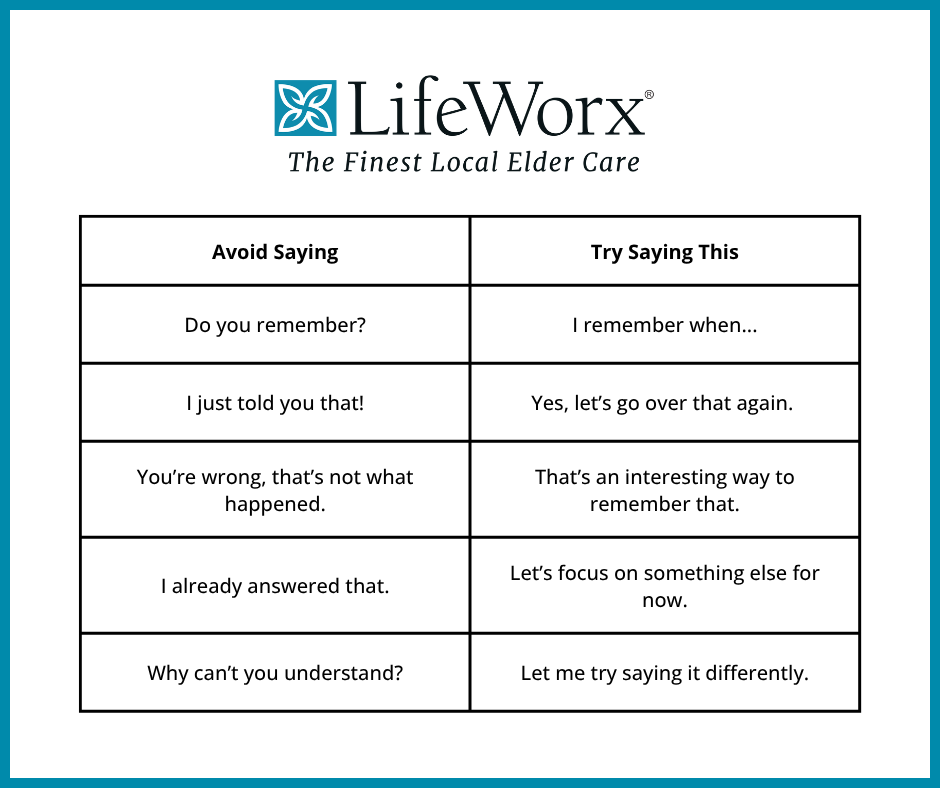
How to Talk to Someone with Dementia
Key Takeaways
- Use simple, calm language—one question or instruction at a time.
- Maintain eye contact and a reassuring tone to create a sense of safety.
- Listen with patience; nonverbal cues often express more than words.
- Avoid arguing or correcting and redirect gently when confusion arises.
Dementia is more than just memory loss. As dementia progresses, a person’s ability to think, reason, and communicate is affected, making conversations difficult. Recognizing these challenges allows family members and caregivers to adjust their approach, ensuring supportive and meaningful interactions.
This article offers practical techniques to improve communication with loved ones who have dementia, helping to reduce stress and frustration while creating a supportive environment.
Why communication is challenging
Dementia impacts several areas of the brain related to communication:
- Memory loss: Individuals may struggle to recall recent events, recognize familiar people, or remember words.
- Language processing: Difficulty finding words, forming sentences, or understanding complex language can make conversations challenging.
- Attention and focus: Maintaining attention or switching topics can be overwhelming.
- Problem-solving and reasoning: Logical thinking may decline, leading to misunderstandings or unexpected responses.
Understanding the impact of these changes can help you adapt your communication style. Adjusting your approach to meeting them where they are is key rather than expecting your loved one to communicate as they did before.
Recognizing common communication challenges
One of the most common issues people living with dementia experience is repetition. A person with dementia may ask the same questions over and over again, not remembering they’ve asked it or gotten an answer. Responding with irritation can create stress, while a calm response can be reassuring.
Another common challenge involves false accusations, such as blaming someone for stealing an item they misplaced. These accusations are typically motivated by confusion, fear, or memory gaps. Arguing or trying to correct the person rarely helps and can often escalate the situation.
People with dementia can also struggle to follow open-ended questions and complicated instructions. They may lose track of the topic and become overwhelmed. Additionally, emotional responses can be heightened. A person may become frustrated or upset if they feel rushed or misunderstood.
Practical communication tips
Here are effective strategies to improve communication with loved ones who have dementia and reduce frustration for both of you:
Speak clearly and simply
- It’s important to speak using short, direct sentences so that the person can better follow along.
- Ask only one question at a time to avoid overwhelming them.
- Yes or no questions are generally easier for individuals with dementia to answer. For example, instead of asking, “What would you like to do today?” you can ask, “Would you like to go for a walk today?”
Be patient, present, and engaged
- Processing information may take longer, so responses may not come quickly. Maintaining a calm demeanor can help ease feelings of anxiety or confusion.
- If your loved one loses their train of thought, a gentle prompt like, “You were telling me about your telephone,” can guide them back on track without adding pressure.
- Always start by making eye contact, using the person’s name to get their attention, and speaking slowly using a calm tone.
Repeat yourself when necessary
- If your loved one doesn’t understand something, gently repeat yourself.
- If necessary, rephrase the statement rather than insisting on the original wording to provide a more straightforward path to comprehension. For example, instead of asking, “Can you set the table for lunch?” you can ask, “Could you help put forks on the table?”
Validate their feelings
- Providing comfort and reassurance can be more important than factual accuracy, showing your loved one that you understand and care about their emotions.
- For example, you might say, “I can see you’re feeling worried. I’m here to help.” This approach can build trust and reduce distress.
What to avoid
Speak too fast or loudly
- A loud voice can come across as aggressive, and fast speech might overwhelm or confuse your loved one. Instead, use a calm, gentle tone and check for understanding through visual cues.
Avoid interrupting
- Interrupting your loved one can increase feelings of anxiety and may make them feel dismissed. Even if there are long pauses, try to provide space and encouragement instead of filling the silence.
Talk about overly complex topics
- Keep conversations focused on familiar, comforting subjects.
- Avoid talking about complex or unfamiliar topics that may cause confusion or distress and direct the conversation toward past experiences or preferences that may provide comfort.
Talk down to them
- Use respectful and kind language, acknowledging your loved one’s dignity.
- Patronizing language can cause frustration and sadness. Avoid phrases such as “You know better than that,” as these can create feelings of inadequacy or frustration.

These alternative phrases can reduce stress, avoid confrontation, and maintain the dignity of a person with dementia. Supportive statements can de-escalate tense moments, making the person feel safe and understood.
The value of in-home dementia care
In-home dementia care provides compassionate and personalized assistance, allowing individuals to stay in a familiar and comforting environment. This type of care helps maintain daily routines and independence while creating opportunities for meaningful connection. When communication becomes difficult, consistent care from a familiar person can reduce confusion and anxiety. Our in-home caregivers may notice subtle changes in behavior and respond with sensitivity.

















